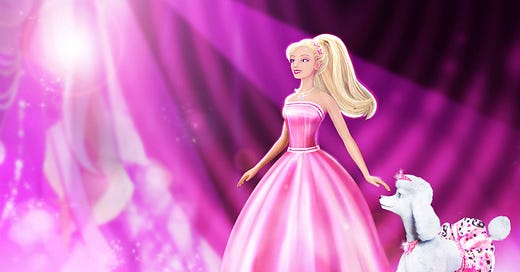When they broke the Barbie universe before
First came meta-text and then the 1001 adaptations of the Princess and the Pauper...
This article was originally written in July 2023 for the now-defunct Tagged Online. I wanted this to exist elsewhere besides the ether and my dangerously full Google Drive. I have not edited or made any amendments. Feel to judge the girl I was then :)
Just like any 25-year-old teenage girl, my qualms with late-stage capitalism have been suspended in anticipation of the Barbie movie, out on 21 July. Greta Gerwig’s interpretation promises to break our conceptions of Barbara Millicent Roberts. However, the pinktastic plastic planet of the blonde bombshell has already suffered Avengers: Endgame levels of disturbance.
The first animated film is 2001’s Barbie in the Nutcracker, which is structured as a fable Barbie tells her little sister, Kelly, to inspire perseverance for her ballet solo. The early movies all follow a similar structure. Barbie stars as the protagonist in a story she’s sharing with her younger sister to teach her an important life lesson. The movie titles make it evident that Barbie is an actor, she’s ‘in’ these movies, or playing ‘as a character: Barbie as Rapunzel, Barbie in The 12 Dancing Princesses, Barbie as the Island Princess, Barbie Presents: Thumbelina, and so on.
We were expected to understand Barbie as a real person in our world who acts in movies the same way Julia Roberts or Anne Hathaway would. But then in 2010, Mattel decided to shatter the fourth wall with Barbie: A Fashion Fairytale. This entry begins with the Princess and the Pea fairytale, par for the course for the franchise’s favoured genre, before the first scene is filled with dancing zombie peas, a director yells ‘cut’ and we learn that Barbie is an actor on set. She’s quickly fired and suffers an existential crisis over her place in the world when she’s not an actor.
The 2010s was an era wherein Mattel wanted to shift the franchise’s focus away from fairy tales and princesses to fashion and music-focused plots involving Barbie in the modern world with her family and friends.
In this new paradigm, Barbie continually grapples with fame and the world’s expectations. She’s subject to parasocial relationships and the social media panopticon–one film actually sees her struggling to become an influencer/vlogger. The franchise no longer focuses on Barbie as a conduit for everyman characters we as viewers can transpose ourselves on.
Instead, they’ve given her autonomy. Her struggle to find her voice, do the right thing, and spread kindness are uniquely Barbie’s. She’s not playing a 2-dimensional character with a singular trait that serves their character arc. Barbie is a modern girl with her own quirks, flaws, and blindspots, and even in a world of diamond castles and pixie fashion designers, the extreme terrors and ecstasy of girlhood persist.
Hanger Management is free today, tomorrow, and probably every day after that because social media platforms hate Africans haha. Not that you have to, but if you’d like to support me financially, you can donate any amount to my tip jar or become a member of my Patreon (there is a free tier, so you should join anyway). Your contribution goes toward financing my media subscriptions, research costs, materials for sewing projects, paying my podcast editor, the odd cold one or two, and pressuring me into producing more.
You know you love me,
xoxo Khensani




